Related Research Articles

Lionhead Studios Limited was a British video game developer founded in July 1997 by Peter Molyneux, Mark Webley, Tim Rance, and Steve Jackson. The company is best known for the Black & White and Fable series. Lionhead started as a breakaway from developer Bullfrog Productions, which was also founded by Molyneux. Lionhead's first game was Black & White, a god game with elements of artificial life and strategy games. Black & White was published by Electronic Arts in 2001. Lionhead Studios is named after Webley's hamster, which died not long after the naming of the studio, as a result of which the studio was very briefly renamed to Redeye Studios.

Populous is a video game developed by Bullfrog Productions and published by Electronic Arts, released originally for the Amiga in 1989, and is regarded by many as the first god game. With over four million copies sold, Populous is one of the best-selling PC games of all time.
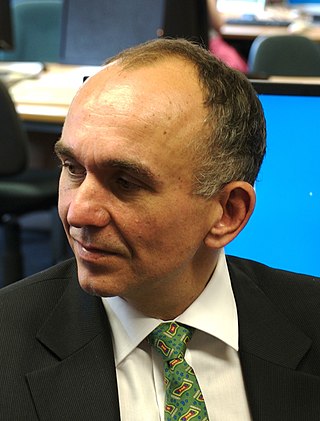
Peter Douglas Molyneux is an English video game designer and programmer. He created the god games Populous, Dungeon Keeper, and Black & White, as well as Theme Park, the Fable series, Curiosity: What's Inside the Cube?, and Godus. He currently works at 22cans.

Bullfrog Productions Limited was a British video game developer based in Guildford, England. Founded in 1987 by Peter Molyneux and Les Edgar, the company gained recognition in 1989 for their third release, Populous, and is also well known for titles such as Theme Park, Magic Carpet, Syndicate and Dungeon Keeper. Bullfrog's name was derived from an ornament in the offices of Edgar's and Molyneux's other enterprise, Taurus Impact Systems, Bullfrog's precursor where Molyneux and Edgar were developing business software. Bullfrog Productions was founded as a separate entity after Commodore mistook Taurus for a similarly named company.
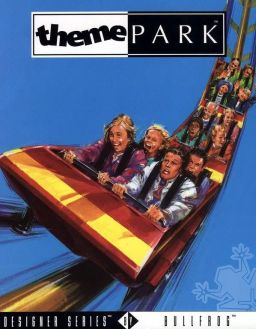
Theme Park is a construction and management simulation video game developed by Bullfrog Productions and published by Electronic Arts in 1994. The player designs and operates an amusement park, with the goal of making money and creating theme parks worldwide. The game is the first instalment in Bullfrog's Theme series and their Designer Series.
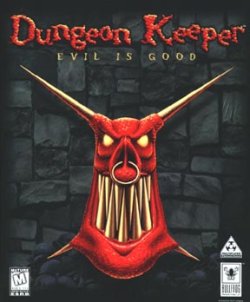
Dungeon Keeper is a strategy video game developed by Bullfrog Productions and released by Electronic Arts in June 1997 for MS-DOS and Windows 95. In Dungeon Keeper, the player builds and manages a dungeon, protecting it from invading 'hero' characters intent on stealing accumulated treasures, killing monsters and ultimately the player's demise. The ultimate goal is to conquer the world by destroying the heroic forces and rival dungeon keepers in each realm. A character known as the Avatar appears as the final hero. Dungeon Keeper uses Creative Technology's SoundFont technology to enhance its atmosphere. Multiplayer with up to four players is supported using a modem, or over a local network.

Populous: The Beginning is a real-time strategy video game and the third entry in the Populous series, developed by Bullfrog Productions. The game was released in 1998 on Microsoft Windows, and in 1999 for the PlayStation. Unlike earlier games in the series, which cast the player in the role of a god influencing loyal followers, The Beginning took a radical departure and placed the player in the role of a shaman, who directly leads her tribe against opponents. Throughout the twenty-five missions of the campaign, the player leads their tribe across a solar system, dominating enemy tribes and tapping new sources of magic, with the ultimate goal of the shaman attaining godhood herself.
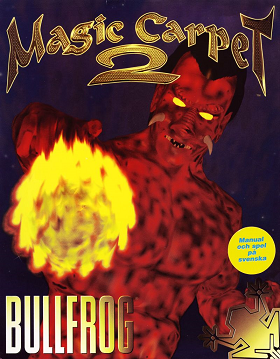
Magic Carpet 2: The Netherworlds is a 1995 video game, the sequel to the Magic Carpet. It was developed by Bullfrog and published by Electronic Arts. It was re-released in 2013 on GOG.com with support for Windows and macOS.

Populous II: Trials of the Olympian Gods is a 1991 strategy video game in the Populous series for the Amiga, Atari ST and MS-DOS-based computers, developed by Bullfrog Productions. Populous II is a direct sequel to Bullfrog's earlier game Populous and is one of the company's most notable games.

Theme Park World, also known as Theme Park 2, and in North America as Sim Theme Park, is a 1999 construction and management simulation game developed by Bullfrog Productions and released by Electronic Arts. The direct sequel to Theme Park, the player constructs and manages an amusement park with the aim of making profit and keeping visitors happy. Initially developed for Windows, it was ported to PlayStation and PlayStation 2, as well for Macintosh computers. The Mac version was published by Feral Interactive.

Fusion is a scrolling multidirectional shooter developed by Bullfrog Productions and published by Electronic Arts in 1988 for the Atari ST and Amiga.
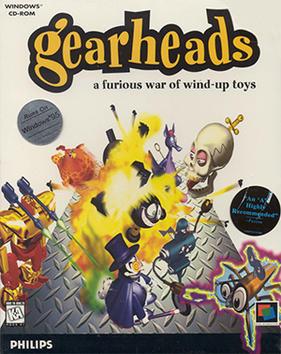
Gearheads is a strategy video game developed by R/GA Interactive and Philips Media, and published by Philips Media for Microsoft Windows and Mac OS in June 1996. The player deploys wind-up toys to get them across an arena while attempting to prevent toys from crossing from the other side. Players can play against the computer or another player. Single, customisable games can be played, or the player can play a series of games with set rules and a limited number of lives in a tournament.
Dungeon Keeper is a series of strategy video games released by Electronic Arts. Two games were developed by Bullfrog Productions for the PC in the late 1990s, and a third was in development but was cancelled before release. A Chinese MMO was in development from 2008–2013 and achieved open beta release, but was cancelled before full launch. A free-to-play game for Android and iOS was developed by Mythic Entertainment and released in 2013.

Micro Machines is a racing game developed by Codemasters and originally published by Camerica for the Nintendo Entertainment System in 1991. Themed around Galoob's Micro Machines toys, players race in miniaturised toy vehicles around various environments. The game is the first installment in the Micro Machines video game series.

Creation was a cancelled real-time strategy video game developed by Bullfrog Productions as a spin-off of their Syndicate series of real-time tactics games. Set on an alien water world, a player-controlled submarine is tasked with looking after marine life and defending it from the Syndicate, who run planet Earth.
Gary Carr is an English video game developer. His career began at Palace Software, where he worked on titles such as Barbarian: The Ultimate Warrior and Barbarian II: The Dungeon of Drax. In 1989, he joined Bullfrog Productions and worked as lead artist on Powermonger and Populous II. He also worked on Theme Park, but, after a disagreement with Peter Molyneux, he left the company to work for The Bitmap Brothers, where he worked on The Chaos Engine 2. He returned to Bullfrog in 1995 hoping to work on Dungeon Keeper, but worked on Theme Hospital instead. He left Bullfrog again in 1998 to join Mucky Foot Productions.
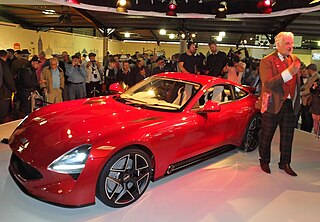
Les Edgar is an entrepreneur, known for being the co-founder and joint managing director of Bullfrog Productions, which he set up with Peter Molyneux. After Bullfrog's acquisition by Electronic Arts in 1995, Edgar became a vice president there. Edgar left Bullfrog in 1999, and eventually left the video gaming industry for the automotive industry, where he reintroduced Aston Martin to racing, and became chairman of TVR, which has, under his leadership, set up partnerships with Gordon Murray and Cosworth. Edgar has stated that he intends to return TVR to Le Mans 24 Hours.

Lost Toys Ltd. was a British video game developer founded in March 1999 by Glenn Corpes, Jeremy Longley, and Darran Thomas, all of whom had previously worked for Bullfrog Productions. Les Edgar helped by providing financial support. Lost Toys was the third Bullfrog break-off group, after Mucky Foot Productions and Lionhead Studios, and was founded due to disillusionment after Electronic Arts purchased Bullfrog.
The Indestructibles is an unreleased arcade strategy video game developed by Bullfrog Productions. The game would have had players control a superhero or a team of superheroes to do battle with super villains.
References
- 1 2 3 4 5 6 7 8 9 10 11 12 13 14 "In The Chair With Glenn Corpes". Retro Gamer . No. 160. Bournemouth: Imagine Publishing. October 2016. pp. 92–97. ISSN 1742-3155.
- 1 2 3 Jon Jordan (18 October 2017). "Twists and turns: How Glenn Corpes accidentally built the "fastest AR action game"". Pocket Gamer.biz. Retrieved 22 October 2017.
- 1 2 "Glenn Corpes Bullfrog". PC Gamer . No. 57. Bath: Future plc. June 1998. p. 38. ISSN 1470-1693.
- 1 2 3 "Work In Progress Bullfrog". The One . No. 12. EMAP. September 1989. pp. 24–28. ISSN 0955-4084 . Retrieved 22 October 2017.
- 1 2 "Bullfrog Productions: A History Of The Legendary UK Developer". NowGamer. 22 February 2012. Archived from the original on 6 July 2017. Retrieved 22 October 2017.
- 1 2 "The Making Of: Populous". Edge. 8 May 2009. Archived from the original on 10 July 2012. Retrieved 22 October 2017.
- 1 2 "The Making Of: Populous". NowGamer. 27 January 2009. Archived from the original on 25 September 2017. Retrieved 22 October 2017.
- ↑ "Behind the scenes of Magic Carpet". GamesTM . Retrieved 22 October 2017.
- ↑ "Now that's MAGIC!". PC Gamer . Vol. 1, no. 9. Bath: Future plc. August 1994. pp. 42–50. ISSN 1470-1693.
- ↑ "The Making Of: Dungeon Keeper". Retro Gamer . No. 143. Bournemouth: Imagine Publishing. pp. 64–69. ISSN 1742-3155.
- 1 2 3 Spanner Spencer (12 October 2009). "Ground Effect racing toward the iPhone from former EA R&D guru". Pocket Gamer . Retrieved 22 October 2017.
- ↑ Jon Jordan (22 August 2011). "Populous man Glenn Corpes' iOS world manipulation, animal herding game Topia is shaping up impressively". Pocket Gamer . Retrieved 22 October 2017.
- ↑ "An Audience With Lost Toys". Audience. Edge. No. 71. Bath: Future plc. May 1999. pp. 107–111. ISSN 1350-1593.
- ↑ "The World According To Lost Toys". PC Zone . No. 88. London: Dennis Publishing. April 2000. pp. 158–161. ISSN 0967-8220.
- ↑ Rob Fahey (2 October 2003). "More UK development woe as Lost Toys shuts its doors". GamesIndustry.biz. Retrieved 22 October 2017.
- ↑ "Lost Toys to develop Stunt Car Racer Pro". Games Xtreme. 2 May 2003. Retrieved 22 October 2017.
- ↑ Jon Jordan (22 October 2009). "One-man band: Glenn Corpes on how old skool tricks kept Ground Effect under 10MB". Pocket Gamer.biz. Retrieved 22 October 2017.
- ↑ "FAQ Glenn Corpes". Edge. No. 97. Bath: Future plc. May 2001. p. 124. ISSN 1350-1593.
- 1 2 Jared Nelson (29 August 2016). "'Fat Owl With A Jetpack' is a Fast-Paced 'Lunar Lander'-like from the Maker of 'Ground Effect' and 'Topia World Builder'". TouchArcade . Retrieved 23 October 2017.
- 1 2 Samit Sarkar (9 October 2012). "Topia World Builder coming to iOS from Populous developer". Polygon. Retrieved 23 October 2017.
- ↑ McLaren Automotive (Mar 22, 2018). How McLaren Automotive uses virtual reality to design its sportscars and supercars. YouTube.